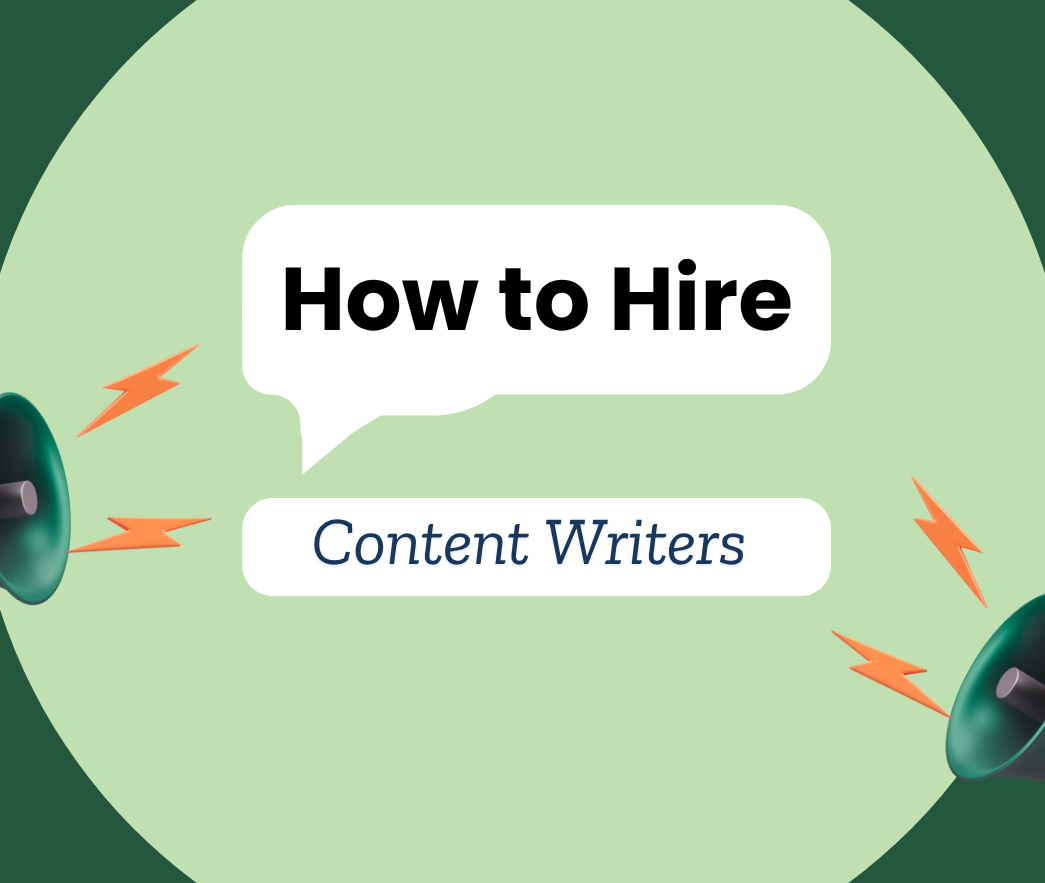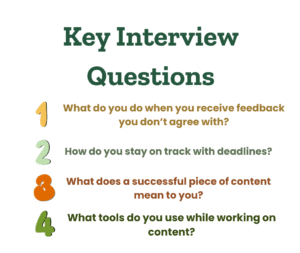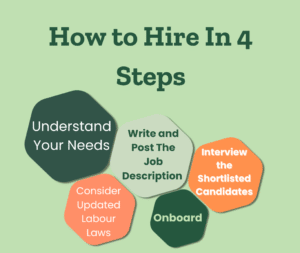Content is king, but what really matters is finding the right content writer to wear the crown. This is because the writer shapes how your brand is seen, how your website ranks, and how your business builds authority over time. So, hiring the wrong writer can lead to inconsistent branding, endless edits, and a mismatch with your team’s work ethic.
The professionals I’ve worked with understood this well. They trusted me to create SEO blog posts, web, ad, and email copy. And the one thing I noticed that they all had in common was a good hiring process.
Hence, in this post, I’ll share insights from their approach, plus expert advice from HR professionals, to help you hire the perfect writers who scale your authority strategically, legally, and effectively.
Let’s get into it.
Step 1: Understand Why and What You Need From a Content Writer
Before you even think about posting a job or scanning portfolios, I want you to take a step back and ask yourself this hard question: “Why are you hiring a content writer in the first place?”
This is where most founders and hiring managers get it wrong. They know they need “content,” but they can’t clearly define what kind, what goals it should serve, or how it connects to the business’s growth strategy. Some don’t even know who a content writer is.
And because of that, they end up hiring the wrong person, then blaming the writer when the results fall short.
Let’s fix that now.
What Does a Content Writer Actually Do?
Content writers aren’t just people who type words for your blog. They’re the ones who help you build trust with your audience, educate them, improve your rankings on search engines, and build your brand’s tone, language, and personality online.
In short, they are here to help achieve brand awareness.
Depending on their experience and skill set, a content writer can create blog posts, ad copy, email newsletters, website copy, product descriptions, whitepapers, LinkedIn posts, landing pages and more. However, not every writer excels in all of these areas. Several are generalists. Few are specialists. Some are SEO experts. Many are brilliant storytellers.
That’s why you need clarity first.
What Should You Know Before Hiring?
Here’s a checklist to help you define exactly what kind of writer you need:
- Your business size
Are you a startup trying to gain visibility fast? A growing business needing regular blog content? A large company with a full content team? Your stage will influence whether you need a full-time hire, a part-time retainer, or a flexible freelancer.
- Your goals
Do you want to increase website traffic? Build thought leadership? Improve conversions on your landing pages? Or maybe you’re launching a product and need content to support the rollout. Be specific.
- The content types you need
Is it blog posts? LinkedIn articles? SEO content? Email campaigns? Or all of the above? Writers tend to have strengths in specific content types, and knowing what you need helps you find someone who actually delivers on it. Remember, writers are humans, too. Don’t ask them to produce everything alone.
- Your budget
Be honest about what you can afford. Freelancers charge differently from in-house hires. Some charge per word, others per hour or project. If your budget is tight, you might not be able to afford a top-tier freelancer, but you can still find someone good who’s growing into that level for an in-house role.
- Your expectations
Which industry experience should the writers have? How fast do you need content? Do you want them available on Slack daily? Will they join team calls or work independently? Do you expect them to upload to your CMS? Set realistic expectations and communicate them clearly.
When you’ve answered these, you will hire the right kind of writer for your business.
Step 2: Write a Job Description That Attracts the Right Type of Content Writer
Now that you know what kind of writer your business truly needs, the next step is to put it into words in a way that draws the right people in. Based on my experience working with founders, startups, and teams that truly got the best out of me, here’s what works:
- Start with your mission
Don’t dive straight into tasks. Let writers know what your brand stands for and why this role matters to your larger business goals. Remember, good writers are vision-driven. We want to know your “why.”
- Be clear about the role
Is it freelance or full-time? Remote or on-site? Are you hiring for one project or an ongoing need? Say it plainly. Clarity shows respect for everyone’s time.
- Describe your ideal writer’s personality and values
Beyond skills, what kind of person thrives on your team? Do they need to be self-managed? Comfortable working in fast-paced environments? Do you value curiosity, humility, or boldness? These clues help the best writers know if they can work with you.
- List the responsibilities and deliverables
Use bullet points and keep it simple. For example: write and optimize 4 blog posts/month, collaborate with the marketing lead during strategy calls, upload final drafts to WordPress with basic formatting, and conduct basic keyword research.
- Include your budget range
This one’s big. Please don’t skip it. Even if it’s a range, including competitive pay shows transparency and builds trust. You can note if it’s negotiable or based on experience.
- Mention your hiring process and timelines
Will there be a paid test? An interview? When should they expect to hear from you? Set the tone early for a professional, respectful process.
Bonus Tip: Use My Job Description Template
Step 3: Post the Job Description on the Right Platforms
So, you’ve written a clear, compelling job description. Nice work. But where exactly do you post it to find quality content writers who will not only “get it” but also stick with you and help your brand grow?
Here are some of the best job platforms to find the type of writers who understand authority, SEO, branding, and building trust:
- LinkedIn Jobs: This works great if you’re looking for writers who have a strong professional presence and want a long-term collaboration. Additionally, LinkedIn allows you to filter by location and industry.
- ProBlogger Job Board: This one is full of seasoned blog writers. If your business runs on high-quality blog content that ranks, this platform has writers who speak your language.
- Indeed: Especially helpful if you’re hiring in-house or need someone for a long-term contract. It’s more traditional, but still effective.
- Reddit (e.g., r/HireaWriter): Yes, Reddit. It’s informal, but you can find freelancers who are highly skilled and hungry for great projects.
- Content Writers’ Websites (like mine): Hear me out. Writers who invest in a professional website often have a portfolio, rates, and a clear style. You get to assess if their voice matches yours before even reaching out.
According to the founders I worked with, it is recommended that you don’t rely too much on referrals because this might lead to hiring out of pity. And can make you hire wrongly. Remember, you’re looking for someone who’s a personality fit, a process fit, and a performance fit.
Step 4: Evaluate Potential Candidates
Great, so applications are rolling in. But this is where it gets tricky. Because just like you, content writers know how to sell with words. Their content is polished. Portfolio is clean. Their confidence is high. And that’s good. But your job now is to go beyond the surface and figure out if they can really deliver results for your business.
Here’s how to evaluate content writers in a way that respects your time and gets you closer to the right hire.
-
Start With The Portfolio (But Don’t Stop There)
A portfolio shows you the past works the writer has done. Check if their writing style aligns with your brand voice or if they can adapt, they understand formatting, SEO, and clarity, and they’ve worked with businesses similar to yours or in your industry.
-
Use Paid Skill Tests (This Attracts the Real Talent)
Here’s something many companies miss: top writers mostly skip free tests. But when you’re willing to pay even a small amount to see what their content would look and sound like for your brand, you show you respect their time and in return, they’ll show you what they’re truly capable of.
Here’s how to pick the type of skill test you should use:
- Keep it relevant to the job. If you need a blog post writer, don’t give them an email copy assignment.
- Provide clear content instructions and brand context (audience, goal, etc.)
- Set a deadline, but give enough time for quality.
- Offer compensation. (₦5,000–₦15,000 in Nigeria or $30–$50 in Canada is enough to attract top writers.)
You should look for originality, voice, and clarity, as well as how well they follow directions, their ability to conduct deep research, SEO awareness (if hiring an SEO content writer), and, most importantly, their thought process.
- Review their LinkedIn Profile
A LinkedIn profile will show you how the writer positions themselves, the relationships, endorsements, and recommendations they build and how long they’ve been writing professionally.
Still, don’t focus on only their degrees (BA., MBA, etc)
Some of the best writers I’ve worked with don’t have writing degrees. What they do have are:
- Certifications from content academies or SEO schools.
- Writing-related courses they’ve taken and applied.
- Proof of results: ranked blog posts or growth in authority.
-
Shortlist Candidates Based on Fit
At this point, you’ll likely have a mix of decent writers. But your goal isn’t to hire “decent.” You want someone who understands your brand’s tone, can work well with your team, can communicate clearly and consistently, is open to feedback, and gives helpful feedback, too.
Once you’ve got your shortlist, you’re ready to schedule interviews.
Step 5: Hire Content Writers by Interviewing Shortlisted Content Writers
This is the step that most founders and recruiters either overdo or skip entirely.
But if you want to build something solid like a writer that drives industry authority, trust, and engagement, you need someone who’s skilled at writing and communicating with a team.
- To lead an interview that gets you the best writer fit, keep the interview casual but focused.
Writers tend to do their best work when they feel at ease. So ditch the intimidating energy. This isn’t a grilling. It’s a conversation between two humans trying to figure out if they can build something together.
Let them talk. Ask questions that go deeper than their portfolio. Listen for alignment, not just ability.
The 7 Most Impactful Interview Questions to Ask a Writer
You don’t need 20 questions. You just need to ask questions that reveal their thought process, values, adaptability, and communication skills.
Here are seven that work every time:
- “Tell me about your favourite piece of content you’ve written and why you loved writing it.”
- “How do you typically approach a new writing project?”
- “Have you ever written for a brand whose tone was very different from your own?”
- “What do you do when you receive feedback you don’t agree with?”
- “How do you stay on track with deadlines when you’re managing multiple clients or projects?”
- “What does a successful piece of content mean to you?”
- “What tools do you use while working on content?”
Bonus Tip: Always leave room for their questions.
Step 6: Consider the Legal and Cross-Border Hiring Labour Laws
According to an interview I had with HR experts like Imole, Founder of Luminous Consultings, if you’re hiring a freelance writer, especially one across borders, you can’t afford to ignore the legal aspect. This is because skipping this step can lead to compliance issues, tax problems, or worse, making your business vulnerable to legal attacks (e.g., being sued).
A simple and practical way to observe it is to understand the labour laws of the country you want to hire talent from. Each one comes with different legal expectations, especially when you’re hiring from Canada and the writer is based in another country (like Nigeria, the US, or the UK).
Other noteworthy insights from leading recruiters include the following:
- If you’re hiring within Canada, employment laws vary by province (e.g., Ontario’s Employment Standards Act), so you need to be sure of what your province requires when it comes to contracts, benefits, and termination.
- When hiring across borders (e.g., from Nigeria), you only need to observe Nigerian Labour laws, so utilize payment tools like PayPal, Wise, or Payoneer to facilitate smoother cross-currency transactions.
In Canada, if you’re hiring a contractor, they’re responsible for their taxes. But you still need to issue a T4A or T5018, depending on your arrangement.
- Budget for currency conversion fees and any withholding taxes you may be responsible for.
- If you’re hiring someone based in Nigeria, you won’t be challenged by hidden labour laws, as Nigeria is the easiest country to work with.
Step 7: Hire, Onboard, and Manage the Content Writer
Hiring a writer also involves documenting their signed contracts and creating a space where they can understand your vision, create content that reinforces your authority, and stay consistent without constant hand-holding.
Tips on How to Hire, Onboard and Manage Hires:
1. Start with a Strong Onboarding
Once you’ve made your choice and the paperwork is signed, onboarding should be your first investment.
At minimum, send them:
- A welcome note with a quick intro to your business and brand.
- Access to your brand style guide.
- Examples of content you love (and what you don’t want to see).
- The metrics that matter to you (content ranking, authority, engagement, etc.).
2. Set Expectations Around Communication and Workflow
This one tip will save you from weeks of back-and-forth:
Decide how and when you’ll communicate.
- Will you check in via email, Slack, Teams, or Notion?
- Do you prefer weekly calls, async updates, or team meetings?
- Should they submit drafts via Google Docs or Microsoft Word?
3. Use Collaboration Tools That Simplify Everything
Your tools can make or break the process. Here are a few I recommend:
- Google Drive, Microsoft Teams, Notion: For content calendars and writing docs.
- Trello, ClickUp, Asana, or Monday.com: To manage tasks and due dates.
- Loom: To record short videos explaining tasks instead of long, repetitive meetings.
- Grammarly or Hemingway: For editing and polishing before the writer submits it to the editors.
4. Give Feedback That Builds Trust, Not Fear
The best relationships and content results I’ve had with clients come from how kindly and they gave feedback. It helped me write faster, better, and with more confidence. Here is how to give feedback:
- Be specific: “This paragraph feels off-brand” is better than “this is wrong.”
- Sound encouraging: Highlight what you loved, not just what you want changed.
- Be consistent: Don’t disappear after giving the feedback. Writers need rhythm to grow your authority via high-quality content.
- Stick to one review process: Having multiple reviews would only frustrate you and the writer, leading to subpar work.
5. Track Performance and Results Together
Finally, remember that you’re hiring a content writer to get results. So, build a system for tracking progress.
Together with your writer, you can track:
- Keyword ranking status on SERP.
- Reader feedback or comment engagement.
And if the content isn’t meeting any of the above metrics, make it a team discussion, not a blame game.
Conclusion: Hire the Best Writer Here
Even if you follow this hiring step perfectly, the real magic only happens when you find a content writer who gets your brand.
You need someone who can help your brand show up on the first page as an authority, works like your partner, writes with strategy, cares about your results as much as you do, communicates clearly, and builds trust consistently.
If that’s what you’re looking for, I’d love to work with you. Contact me now to purchase my time and services.
Are you still exploring? No problem. Read this article on the best hiring tools that would help you streamline your hiring process.
FAQs About Hiring Content Writers
What are the do’s and don’ts of hiring a writer?
| Do | Don’t |
|
|
What is the cost of hiring writers from Nigeria, Canada, the United States, and Australia?
| Country | Freelance Blog Post (Per Article) | Retainer (Monthly Pay) |
| Nigeria | ₦15,000 – ₦100,000 | ₦200,000 – ₦450,000 |
| Canada | $150 – $1,500 CAD | $10,000 – $40,000 CAD |
| United States | $300 – $1,500 USD | $30,000 – $60,000 USD |
| Australia | $300 – $1,500 AUD | $10,000 – $50,000 AUD |
Where is the best place to hire content writers?
Some of the best places include:
- LinkedIn Jobs: Great for finding experienced professionals with public portfolios.
- ProBlogger Job Board: Ideal for finding writers who specialize in blog content.
- Indeed & Upwork: Useful but crowded; requires filtering.
- Niche websites: Like my own, where you can hire a content writer with SEO, strategy, and content marketing experience all in one.
How much does it cost to hire a writer?
$300 – $500 per blog post for mid-level writers with proven SEO results, $500 – $1,000+ for expert-level writers, and $30,000 – $60,000/month for full content retainers or ongoing partnerships.
Remember: you’re not paying just for words, you’re paying for results. For example, my best clients paid me to write, rank their blog, and build their authority..
What is the new way of hiring content writers?
Hire writers with a portfolio, then pay half upfront to start the work and pay the remaining balance only when the results show.




